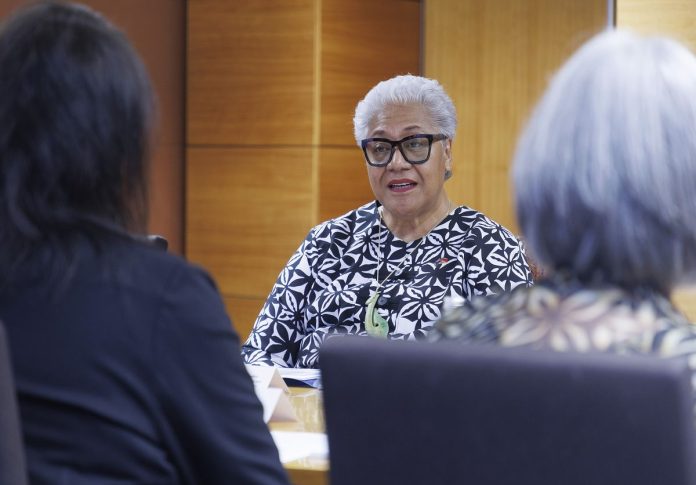Samoan Prime Minister Fiame Naomi Mata’afa has criticised the United State for changing its strategic language around the Pacific without consulting the region, adding the growing competition between the Chinese and American governments was “an opportunity not to be missed.”
Speaking in Canberra on Monday, Mata’afa said there had been new “narrative” created by the U.S and its diplomatic partners about the “Indo-Pacific region,” combining the Indian Ocean and the Pacific Ocean into one large strategic zone as part of Washington’s strategic competition against Beijing.
“The Pacific islands were never consulted about that new narrative, or had a discussion,” she said at an event hosted by the Lowy Institute think tank.
“Given that we occupy a very large space of one of those oceans, one might have thought that having some input from the Pacific Islands might have been a good idea.”
Mata’afa is the first female leader of Samoa and has been a vocal advocate for greater action on climate change from major powers to protect the Pacific from rising sea levels. Relations between Australia and the Pacific have improved following the election of the center-left Labor government in May, which committed to take greater action on climate change.
In recent years, Samoa and other Pacific nations have found themselves in the centre of growing strategic competition between China and the U.S and its allies, including Australia and New Zealand. In April 2022, China signed a security agreement with the Solomon Islands, its first in the region and a diplomatic coup for Beijing.
Subsequently, the U.S and Australia dramatically stepped up their diplomatic efforts in the region to counter Beijing.
Mata’afa said the Pacific needed to stick together as part of a regional collective to better leverage its new-found influence in geopolitics.
“Before people just used to see the Pacific as a big ocean, with a few dots in it,” she said. “But now because the situation has changed they actually see us, or they see the Pacific in a different way. And it’s not an opportunity to be missed,” she said.
SOURCE: BLOOMBERG/PACNEWS















[…] Police Force. This, coupled with Rabuka’s public support for AUKUS — a surprising move given strong regional criticism of the arrangement — signals a shift towards overt strategic alignment with Australia and the […]
[…] This, coupled with Rabuka’s public support for AUKUS — a surprising move given strong regional criticism of the arrangement — signals a shift towards overt strategic alignment with Australia […]
[…] Police Force. This, coupled with Rabuka’s public support for AUKUS — a surprising move given strong regional criticism of the arrangement — signals a shift towards overt strategic alignment with Australia and the […]